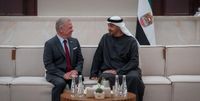His Majesty King Abdullah met with United Arab Emirates President Sheikh Mohamed bin Zayed Al Nahyan in Abu Dhabi on March 25, 2025, to address regional issues concerning the ongoing conflict in Gaza and escalating tensions in the West Bank. This meeting, held at Al Bateen Palace, focused on strengthening the enduring ties between the two nations and exploring avenues to expand cooperation across various fields.
The King was welcomed at Al Bateen Executive Airport by Sheikh Mohamed and several senior officials, setting a tone of collaborative dialogue between the nations. During the meeting, the leaders discussed pressing regional developments, emphasizing the critical need to halt the war on Gaza and resume humanitarian aid flows that have been interrupted due to the ongoing conflict.
In a statement released by the Royal Court, it was highlighted that both leaders reiterated their commitment to reject any efforts aimed at displacing Palestinians from their lands. This sentiment underscores the shared values and collective responsibility felt by both Jordan and the UAE towards the Palestinian cause, which remains a focal point of Arab cooperation.
The dinner invitation extended by Sheikh Mohamed, where he hosted an iftar for King Abdullah and his team, reflects the spirit of hospitality and solidarity, particularly in the context of the current Ramadan observances, a significant period for both nations. Joining King Abdullah in his visit were Prime Minister Jafar Hassan, Deputy Prime Minister and Foreign Minister Ayman Safadi, and Director of the Office of His Majesty Alaa Batayneh, all underscoring the importance of governmental representation during this critical dialogue.
Notably, this meeting comes at a time of increased regional instability. The ongoing war in Gaza has escalated fears of broader conflicts throughout the Middle East. As the King and UAE President engaged in discussions on these humanitarian issues, the international community remains watchful, anticipating further measures that might come from regional powers in response to the conflict.
By maintaining open lines of communication and collaboration, Jordan and the UAE aim to play a vital role in advocating for peace and stability. Their discussions on humanitarian aid reflect a broader commitment among Arab states to safeguard the well-being of Palestinians during a particularly precarious time.
The meeting is indicative of the evolving relationships in the Middle East, where leaders are increasingly recognizing the need for unity in the face of adversity. As both nations strive to bolster their security and stability, their dialogue serves as a hopeful reminder that collective efforts can lead to meaningful outcomes.
In conclusion, the ongoing discourse between Jordan and the UAE illustrates the profound connections that exist between the two nations. It further highlights the urgency of addressing humanitarian concerns arising from the Gaza conflict. As King Abdullah and Sheikh Mohamed continue their dialogues, the efforts to halt violence and promote peace demonstrate a significant step towards restoring a sense of normalcy for the affected populations.





